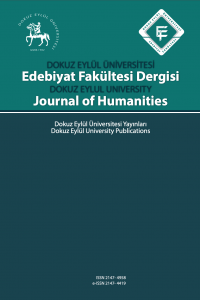Öz
Kaynakça
- Adams, D. (2015). The Man Who Couldn't Stop: OCD and the True Story of a Life Lost in Thought. New York: Farrar, Straus and Giroux. American Psychiatric Association. (1980). Diagnostic and Statistical Manual of Mental Disorders. (3rd ed.). Washington DC: American Psychiatric Association. American Psychiatric Association. (2013). Diagnostic and Statistical Manual of Mental Disorder. (5th ed.). Washington DC: American Psychiatric Association. Balaev, M. (2008). Trends in Literary Trauma Theory. Mosaic: An Interdisciplinary Critical Journal, 41(2), 149–166. Caruth, C. (1995). Trauma: Explorations in Memory. Baltimore: JHU Press. Caruth, C. (1996). Unclaimed Experience: Trauma, Narrative, and History. Baltimore: JHU Press. Freud, S. (1955). Moses and Monotheism. (Trans. Katherine Jones). Letchworth: Garden City Press. Freud, S. (1962). Remembering, repeating and working-through. James Strachey, Anna Freud (Eds.), in Standart Edition of The Complete Psychological Works of Sigmund Freud (Vol. 12, p. 145-156). London: Hogarth Press. Harris, Z. (2004). Midwinter. London: Faber and Faber. Herman, J. (1997). Trauma and Recovery: The Aftermath of Violence— From Domestic Abuse to Political Terror. New York: Basic Books. Kaplan, E. A. (2005). Trauma Culture: The Politics of Terror and Loss in Media and Literature. London: Rutgers University Press. Laub, D. and Podell, D. (1995). Art and Trauma. in International Journal of Psychoanalysis (vol. 76, p. 991-1005). LaCapra, D. (2001). Writing History, Writing Trauma. Baltimore: JHU Press. Myers, C. (1940). Shell Shock in France, 1914-1918: Based on a War Diary. New York: Cambridge University Press. Santner, E. (1992). History Beyond the Pleasure Principle: Some Thoughts on the Representation of Trauma. Saul Friedlander (Ed.), in Probing the Limits of Representation: Nazism and the “Final Solution” (p. 143-154). Cambridge: Harvard University Press. Tal, K. (1996). Worlds of Hurt: Reading the Literatures of Trauma. New York: Cambridge University Press. Žižek, S. (2011). Living in the End Times. London: Verso. Billington, M. “Midwinter/Poor Beck.” The Guardian, 8 October 2004. Retrieved on 20 July 2017, https://www.theguardian.com/stage/2004/oct/08/theatre Camegy, P. “RSC Flirts with New Writing.” The Spectator, 23 October 2004. Retrieved on16 April 2016, from http://archive.spectator.co.uk/article/23rd-october-2004/61/the-rsc-flirts-with-new-writing Fisher, M. “Zinnie Harris – Heading for a fall.” The Scotsman, 9 August 2008. Retrieved on 22 May 2015, from http://www.scotsman.com/lifestyle/zinnie-harris-heading-for-a-fall-1-1435673
Öz
Contemporary British theatre has been saturated with war narratives and the ensuing state of trauma in response to the chaotic atmosphere of the century. Besides a wide array of plays depicting the deleterious impact of war on returning soldiers, the contemporary stage has also witnessed performances embodying the personal and collective traumas of war-torn societies. Playwright of the multi-award-winning play Further than the Furthest Thing (2000), Zinnie Harris subtly treat different faces and consequences of war in their dramatic outputs. Among them, Harris’ Midwinter (2004) attempts to portray trauma of an unnamed war engraved on the bodies and psyches of the people from soldiers to children in an unnamed county. Drawing upon contemporary theories of trauma, this article interprets the different manifestations of war trauma in the characters of Midwinter and probes the difficulty of recovering trauma for the people who disavow the reality of war and trauma.
Anahtar Kelimeler
Kaynakça
- Adams, D. (2015). The Man Who Couldn't Stop: OCD and the True Story of a Life Lost in Thought. New York: Farrar, Straus and Giroux. American Psychiatric Association. (1980). Diagnostic and Statistical Manual of Mental Disorders. (3rd ed.). Washington DC: American Psychiatric Association. American Psychiatric Association. (2013). Diagnostic and Statistical Manual of Mental Disorder. (5th ed.). Washington DC: American Psychiatric Association. Balaev, M. (2008). Trends in Literary Trauma Theory. Mosaic: An Interdisciplinary Critical Journal, 41(2), 149–166. Caruth, C. (1995). Trauma: Explorations in Memory. Baltimore: JHU Press. Caruth, C. (1996). Unclaimed Experience: Trauma, Narrative, and History. Baltimore: JHU Press. Freud, S. (1955). Moses and Monotheism. (Trans. Katherine Jones). Letchworth: Garden City Press. Freud, S. (1962). Remembering, repeating and working-through. James Strachey, Anna Freud (Eds.), in Standart Edition of The Complete Psychological Works of Sigmund Freud (Vol. 12, p. 145-156). London: Hogarth Press. Harris, Z. (2004). Midwinter. London: Faber and Faber. Herman, J. (1997). Trauma and Recovery: The Aftermath of Violence— From Domestic Abuse to Political Terror. New York: Basic Books. Kaplan, E. A. (2005). Trauma Culture: The Politics of Terror and Loss in Media and Literature. London: Rutgers University Press. Laub, D. and Podell, D. (1995). Art and Trauma. in International Journal of Psychoanalysis (vol. 76, p. 991-1005). LaCapra, D. (2001). Writing History, Writing Trauma. Baltimore: JHU Press. Myers, C. (1940). Shell Shock in France, 1914-1918: Based on a War Diary. New York: Cambridge University Press. Santner, E. (1992). History Beyond the Pleasure Principle: Some Thoughts on the Representation of Trauma. Saul Friedlander (Ed.), in Probing the Limits of Representation: Nazism and the “Final Solution” (p. 143-154). Cambridge: Harvard University Press. Tal, K. (1996). Worlds of Hurt: Reading the Literatures of Trauma. New York: Cambridge University Press. Žižek, S. (2011). Living in the End Times. London: Verso. Billington, M. “Midwinter/Poor Beck.” The Guardian, 8 October 2004. Retrieved on 20 July 2017, https://www.theguardian.com/stage/2004/oct/08/theatre Camegy, P. “RSC Flirts with New Writing.” The Spectator, 23 October 2004. Retrieved on16 April 2016, from http://archive.spectator.co.uk/article/23rd-october-2004/61/the-rsc-flirts-with-new-writing Fisher, M. “Zinnie Harris – Heading for a fall.” The Scotsman, 9 August 2008. Retrieved on 22 May 2015, from http://www.scotsman.com/lifestyle/zinnie-harris-heading-for-a-fall-1-1435673
Ayrıntılar
| Birincil Dil | İngilizce |
|---|---|
| Bölüm | Makaleler |
| Yazarlar | |
| Yayımlanma Tarihi | 22 Ekim 2020 |
| Gönderilme Tarihi | 10 Mayıs 2020 |
| Yayımlandığı Sayı | Yıl 2020 Cilt: 7 Sayı: 2 |


